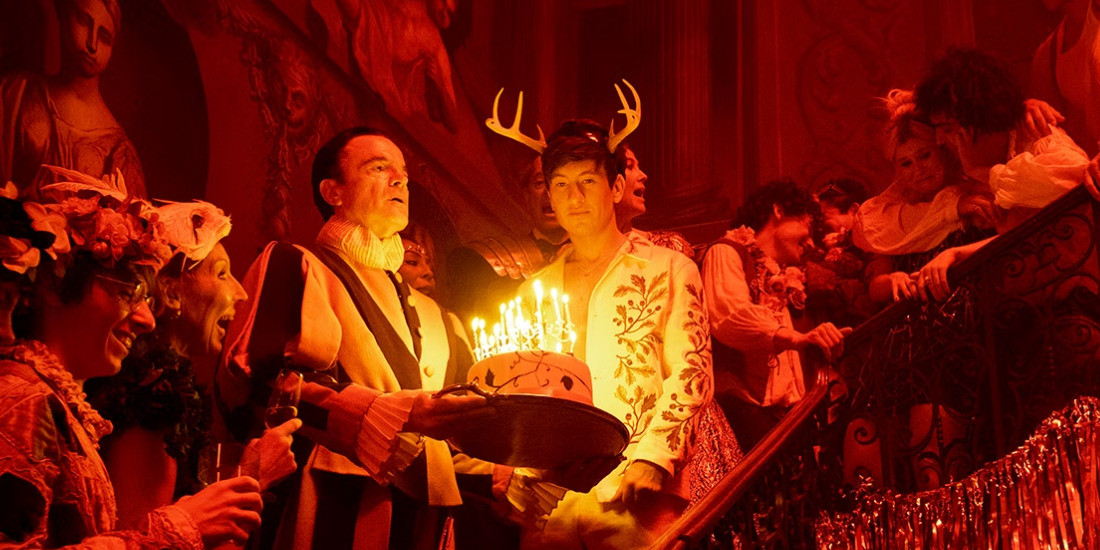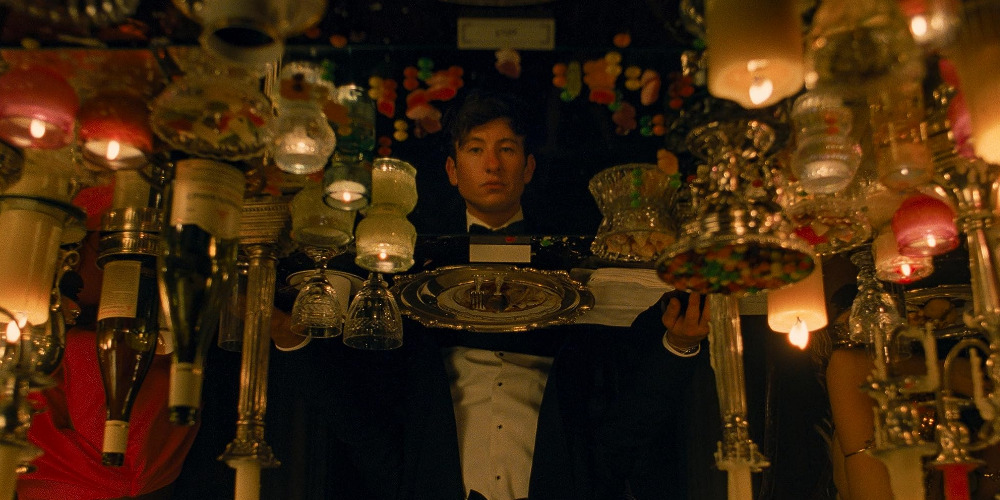The increasingly concerning yet captivating narrative of ‘Saltburn,’ Emerald Fennell’s drama film that harks back to themes of Gothic romance, follows the story of Oliver Quick and his desperate desires. A friendship with Oxford’s sweetheart, Felix Catton, plunges Oliver into an entirely new world defined by excess luxury and careless indulgence. As such, the latter finds himself beguiled by Felix and his lifestyle upon an invitation to stay at the Catton family Estate, Saltburn, over the summer. Nevertheless, just as Oliver’s initial attraction toward Felix grows into an obsession, so does his fascination with the Saltburn Estate.
However, what is it exactly about the Estate that draws Oliver to its glory like a metaphorical moth to the flame? SPOILERS AHEAD!
Oliver’s Desire For The Extraordinary
Since Oliver’s introduction into the film, his pull toward exceptionality remains noticeable. He’s pitched as a socio-economically disadvantaged individual in the cesspool of rich kids steering through life on their family’s wealth. At Oxford, his professors sideline his intelligence in favor of swapping stories with the kids of their parents, who are often the professors’ old classmates. Socially, he’s all but invisible to his peers, except for when they need someone to be the butt of a joke. His clothes don’t fit in with the rich, and neither does he.

At first, these details seem like the building blocks of Oliver’s character, connecting him to the viewers to compel them to pay attention to him and his stories. Of course, his character will be the most likable of the lot when your other options are entitled kids. However, as it would turn out, the same is not a coincidence. As Felix, and by extension the audience, learn the truth about Oliver’s life— a suburban home and loving parents— the realization dawns that Oliver’s compelling “poor and shy boy at Oxford on a scholarship” character has always been a fabrication of his own creation.
Oliver knew he wasn’t intriguing and compelling enough on his own. An upper-middle-class kid with middling intelligence would have blended in with the ordinary to such an extreme extent that no one would have taken notice of him. Nonetheless, Oliver was desperate to stand out. Furthermore, ever since he caught a glimpse of Felix on his first day of university, he couldn’t help the draw he felt to the other boy.
Oliver wanted Felix to notice him, and— more than that— he wanted to stay by Felix’s side. The thing about Felix was that despite being at the center of the spoilt rich kids center, he effortlessly stood out. His naturally kind and harmless disposition made him entirely irresistible. Therefore, just by standing next to Felix, Oliver felt an unprecedented satisfaction from the former’s reflected glory.
Nevertheless, given the blueprint of their relationship— built on Oliver’s ever-growing obsession, Felix’s pitying sympathy, and their helplessly platonic friendship, the structure was bound to collapse. Yet, by the time their friendship could reach such a melting point, Oliver had already found a replacement for Felix to stoke his burning desire for exceptionality.
Saltburn Estate’s Tantalizing World
Although Oliver manages to convince Felix to allow him to stay by his side throughout their months-long friendship at Oxford, he knows he has to pull out a bigger card to continue their relationship outside the university. Earlier, Oliver made up an extravagant lie about his drunken father’s death to prey on Felix’s pity when the latter’s interest in him dwindled. Therefore, at the end of university, Oliver subtly builds upon the same lie about his tragic home life, which compels Felix to invite his friend to his family’s home for the summer.

Oliver likely knew about Felix’s grand estate and the luxurious life it offered from the gossip mill and the like. Still, the real Saltburn Estate still ends up taking him by surprise. The Catton family home is a palace where, according to the family butler, Duncan, one could easily get lost. However, the same isn’t a simple statement and ends up being the raw truth behind the Estate.
Every luxury at Saltburn is available so readily that it loses its novelty. Expensive modern art mounts the walls, where dirty dishes are abandoned without a second thought. Crockery so exorbitant it becomes a showpiece accompany hastily thrown ashtrays and cigarette butts. Saltburn offers such a hedonistic take on indulgence one can’t help but get lost in its pleasures. Thus, Oliver, ever a moth to luxury, can’t help but be attracted toward it.
Class Disparity Themes
Given the film’s subject matter, it’s easy to misconstrue Oliver’s story and his desire for Saltburn as a play on the “eat the rich” genre. However, ‘Saltburn,’ the film, decidedly strays away from that concept. Ever since the reveal of Oliver’s not-so-poor upbringing, the film stutters in its themes of poverty and privilege. For once, it loses any credibility to talk of poverty since there are no primary characters in the film who are poor.

Oliver’s desire to own Saltburn doesn’t come from any vindictive ideas to overthrow the elite. As Fennell best put it herself, ‘Saltburn’ is more “Lick the rich, suck the rich, and then bite the rich, and then swallow them,” than simply eating the rich. The film wants the viewers to understand what makes the Cattons’ lifestyle so attractive, and it wants viewers to confront that a part of themselves craves such a reality.
“They’re all [The Cattons] impossible to resist,” said Fennell in a conversation with Polygon. “The world is impossible to resist. It was important that we understood from the get-go why, against our better judgment, we would all want to be at Saltburn and would do anything to get in and anything to stay.” Thus, Oliver’s indomitable desire for beauty and excess remains his motive in craving Saltburn throughout the film.
Read More: What is Wrong with Oliver in Saltburn? Is He a Sociopath?


You must be logged in to post a comment.